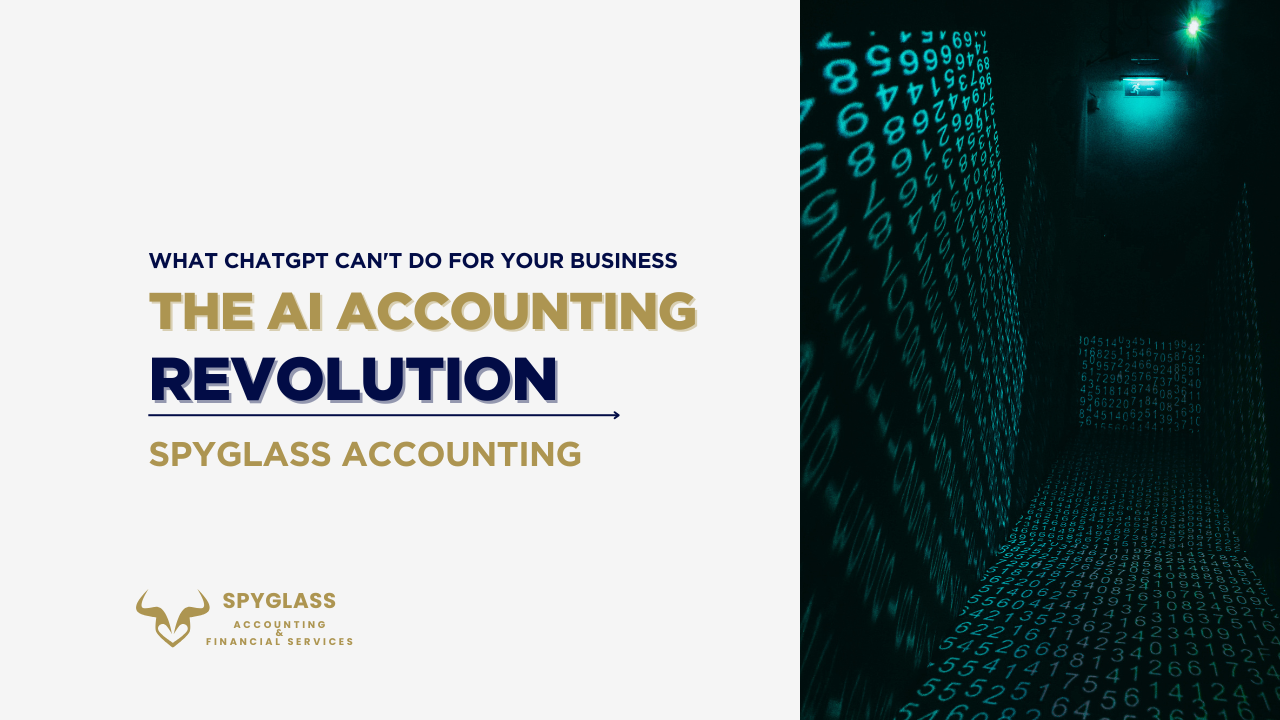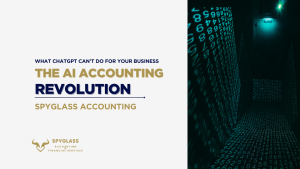
The AI Accounting Revolution: What ChatGPT Can’t Do For Your Business Finances
The ai accounting revolution is buzzing. ChatGPT can draft emails in seconds, and new tools promise to automate everything from bookkeeping to tax prep. But here’s the truth: AI alone won’t save your business from financial chaos.
While AI is transforming accounting, it has critical blind spots that could cost you thousands. This guide reveals:
✅ What AI accounting tools actually do well
✅ 5 financial tasks AI consistently gets wrong
✅ How to blend AI with human expertise for bulletproof finances

The Promise and Limits of AI in Accounting
What AI Does Exceptionally Well
- Data Entry Automation
- Scans receipts/invoices (tools like Dext, Receipt Bank)
- Categorizes 90% of transactions correctly
- Anomaly Detection
- Flags duplicate payments or unusual expenses
- Example: An AI system spotted a $12,000 vendor payment error for a client
- 24/7 Basic Q&A
- ChatGPT can explain depreciation methods
- Provides general tax deadline reminders
Where AI Falls Short (Danger Zones)
| Task | AI Capability | Human Needed For |
| Tax Strategy | Basic calculations | IRS audit defense |
| Financial Forecasting | Historical data analysis | Market nuance interpretation |
| Fraud Investigation | Pattern recognition | Intent determination |
| Complex Bookkeeping | Rule-based tasks | Judgment calls (e.g., R&D credits) |
| Client Advisory | Generic advice | Personalized planning |
5 Financial Tasks You Should Never Trust to AI Alone
- Tax Optimization & Audit Defense
AI Limitation:
- Can’t navigate gray areas (e.g., home office deductions for hybrid workers)
- Misses local tax incentives (like CA’s R&D credit)
Real Example:
A client used TurboTax’s AI and missed $28K in manufacturing deductions. A human CPA caught it during a review.
- Cash Flow Forecasting
Why AI Fails:
- Relies solely on historical data
- Can’t account for:
- Supply chain disruptions
- Client payment delays
- Seasonal fluctuations
Pro Tip: Use AI for baseline projections but have a human adjust for:
- Upcoming expansions
- Industry trends (e.g., interest rate changes)
- Fraud Detection
AI Can Spot:
- Duplicate invoices
- Unusual payment amounts
AI Misses:
- Collusion between employees/vendors
- Sophisticated embezzlement schemes
Case Study:
An employee at a retail business created fake vendors with AI-generated invoices. Only caught when a human noticed the vendor addresses matched employee homes.
- Strategic Financial Planning
ChatGPT Might Suggest:
- “Reduce expenses to improve profitability”
Human Advisor Would:
- Analyze which expenses drive growth (e.g., marketing vs. office space)
- Recommend tax-efficient profit extraction strategies
- Interpreting Accounting Standards
AI Danger Zone:
- Misapplies ASC 606 (revenue recognition)
- Struggles with lease accounting (ASC 842)
Example:
An AI tool capitalized $50K in software costs that should’ve been expensed, creating a compliance risk.

How Smart Businesses Use AI (Without Getting Burned)
The Hybrid Approach That Works
- AI for First Drafts
- Bank reconciliations
- Expense reports
- Humans for Final Approval
- Monthly financial reviews
- Tax filing sign-off
- AI as Assistant, Not Decision-Maker
- Use ChatGPT to:
- Generate financial report templates
- Explain basic accounting terms
- Never use it to:
- Determine tax strategies
- Finalize financial statements
- Use ChatGPT to:
3 Must-Have AI Safeguards
- Human Oversight Protocols
- Require CPA review of all AI-generated tax filings
- Data Quality Checks
- Audit 20% of AI-categorized transactions monthly
- Tool Stack Integration
- Sync AI tools (like Bill.com) with human-reviewed systems (like QuickBooks Online)
AI Accounting Tools We Cautiously Recommend
| Tool | Best For | Human Oversight Needed |
| QuickBooks AI | Categorizing expenses | Review unusual categorizations |
| Vic.ai | Invoice processing | Verify vendor approvals |
| Puzzle | Cash flow forecasts | Adjust for seasonality |
| Blue Dot | Tax compliance | CPA final review |
Red Flag Tools:
- Any “fully autonomous” accounting AI
- ChatGPT for tax advice (it hallucinates IRS rules)
When to Call a Human Accountant (Immediately)
🚩 Your AI tool:
- Asks you to classify personal groceries as “office supplies”
- Can’t explain why your profit doesn’t match bank balances
- Generates tax strategies contradicting IRS publications
💡 Pro Tip: Schedule quarterly “AI Audits” where a CPA:
- Reviews AI outputs
- Checks for compliance risks
- Adjusts automation rules
The Future of AI in Accounting
By 2025, Gartner predicts:
- 80% of accounting tasks will be AI-assisted
- But human-led advisory services will grow 300%
Why? Because AI handles the “what,” but humans solve the “why”:
- AI detects a profit drop
- Human interprets whether it’s due to:
- Rising costs (solution: renegotiate vendor contracts)
- Pricing issues (solution: reposition offerings)
Key Takeaways
- AI excels at repetitive tasks – Use it for data entry, not decisions
- 5 high-risk areas for AI – Taxes, forecasting, fraud, strategy, compliance
- Hybrid approach wins – AI drafts, humans refine
- Never go fully automated – Monthly human reviews prevent disasters
Final Thought
AI is the calculator of the 21st century—powerful but directionless without human expertise. The businesses thriving today aren’t replacing accountants with bots; they’re arming them with AI to achieve more.
🚀 Ready to claim every dollar legally and confidently?
📞 Talk to Spyglass Accounting Today